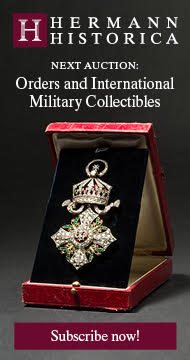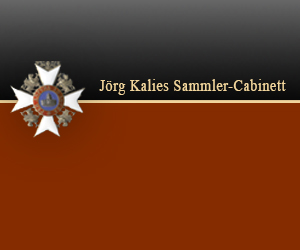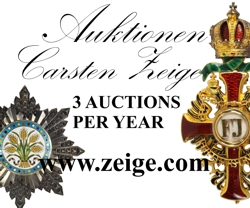Order of Albert the Bear, Grand Master Collar (in silver gilt, 1841)
CATEGORY: Version
SKU: 01.ANH.0101.101.01.000
Estimated market value:

Estimated market value:
A collar constructed of silver gilt with enamels. The collars consist of three different links. The first link consists of a circular medallion with "HFC" in the centre on a white background, topped with a crown within a green enamel laurel leaf and red enamel oak leaf border. The second link consists of an ovular medallion, the centre bears the three enamelled coats of arms from Anhalt-Köthen, Anhalt-Dessau, and Anhalt-Bernburg, encompassed by an ornate border. The third link is an ovular medallion with a black enamelled bear with a gold crown ascending a red enamelled wall on a white background, encompassed by an ornate border. In the centre of the collar the two monogram links are connected by an ornate acanthus link which the Grand Cross is hung from. The remaining links are connected with detailed circular links.
The Grand Cross consists of an ovular medallion. The obverse depicts a crowned bear walking on top of a fortress wall, circumscribed “Fürchte Gott und Befolge seine Befehle” (Fear God and Obey His Commands). The reverse is inscribed “Albrecht der Baer Reg: 1123 bis 1170”.
The Order of Albert the Bear was founded by Prince Sigismund I of Anhalt-Dessau around 1382 and was named after Albert the Bear (1110-1170), the first Ascanian Margrave of Brandenburg and the Count of Anhalt and Ballenstadt. The order was forgotten after Prince Sigismund I’s death in 1405. On November 18, 1836, the order was renewed and made a joint House Order by Duke Henry of Anhalt-Köthen, Duke Leopold IV of Anhalt-Dessau, and Duke Carl of Anhalt-Bernburg. The Order of Albert the Bear was awarded by the Dukes to meritorious subjects as a token of honour and distinction.
The Order of Albert the Bear originally featured three main grades and two merit medals, which included: Grand Cross with Grand Cross Breast Star, Commander, Knight, Gold Medal of Merit, and Silver Medal of Merit. In 1848, the grade of Commander was expanded into I Class Commander with I Class Commander Breast Star and II Class Commander. In 1854, the grade of Knight was expanded into I Class Knight and II Class Knight. From 1863, the reigning Duke of Anhalt was the order’s Grand Master. Non-Christians were not eligible for the order until after 1863.
The Order was amended on July 18, 1864, to incorporate crossed swords as a possible addition for wartime merit. The crossed swords, which are added between the top of the medal and the suspension ring, indicate a Military Division award. The absence of crossed swords indicates a Civil Division award.
In 1901, a surmounting gold-coloured crown was added to the grades of Grand Cross, I Class Commander, II Class Commander, and I Class Knight. A surmounting silver crown was added to the grade of II Class Knight.
The original collar was designed in 1839 and created in 1841. The materials used were gold foil and gilt. In 1865, Duke Leopold Friedrich ordered the construction of a new collar made from pure gold. In 1917, four collars were produced out of bronze gilt. The location of all six of these collars is unknown. Examples do exist, however, they are collector-made reproductions and they are smaller than the originals.
The collar was worn by Duke Henry of Anhalt-Köthen, Duke Leopold IV of Anhalt-Dessau, Duke Friedrich I of Anhalt, and Duke Friedrich II of Anhalt.

Comments
Sign in to comment and reply.


Scroll Top